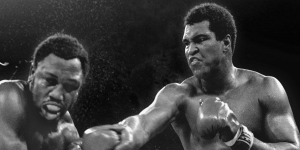At the young age of 12, Cassius Marcellus Clay Jr. (the kid we would come to know as Muhammad Ali) picked up a pair of boxing gloves in preparation for his version of justice. Clay’s bike had been stolen and he told the police that he wanted to exact his own justice by beating up the thief. In a case that can only be described as divine Intervention, the police officer, also a boxing coach, advised Cassius to learn how to fight before he sought justice. The rest, as the saying goes, is history.
Golden Gloves Champion, Olympic Gold Medalist, conscientious objector, heavyweight champion of the world and the “Greatest of All Time” are often synonymous with Ali. Ask anyone about him and these descriptors, sometimes accompanied by a quote, voice imitation and boxing moves, are sure to pop up in the conversation. Whether you were introduced to him as Cassius or Ali, there is no denying the cultural impact his larger-than-life persona has had on global culture.
In celebration of the birth of the GOAT on January 17, 1942 (80 years ago) here are some titles to check out:
New York Times best-selling author Thomas Hauser’s book Muhammad Ali: a Tribute to The Greatest argues that Ali’s persona in the later, post-retirement years is a sanitized version of the controversial and outspoken man that made him a global icon.
Ali’s boxing matches from 1960-1981 are chronicled in Muhammad Ali: The Glory Years, which captures the magnetism and skill that made him a legend.
In the early 1960s, Clay converted to Islam and became Cassius X. Two years later he made international news as a conscientious objector to the Vietnam War and was incarcerated for refusing the draft. The consequences of these choices, as well as his evolution as a humanitarian and messenger of peace, are highlighted in the documentary The Trials of Muhammad Ali.
In 1964, Ali (still known as Cassius Clay) defeated Sony Liston in a match at the Miami Convention Center that many, except for his friend Malcom X, believed Clay would lose. In One Night in Miami, award-winning actress Regina King steps behind the camera as director to creatively re-imagine the post-fight celebration/meeting that brought together NFL star Jim Brown, Malcolm X and singer Sam Cooke (all at the height of their popularity) to discuss their responsibilities in the struggle for civil rights.
George Foreman’s 1974 match with Ali in Zaire, known as the "Rumble in the Jungle," was one of the most anticipated fights of both his and Ali's careers. In the documentary When We Were Kings, the excitement of Ali dethroning of the undefeated world champ was rivaled only by Ali’s out-of-the-ring engagement with the people of Zaire.
A humbler Ali is presented in his own words in The Soul of A Butterfly, which details his life after retirement, his battle with Parkinson's and his work as the United Nations Messenger of Peace.
Which of Ali’s fights (inside or outside of the ring) do you think earned him the title of Greatest of All Time?



Add a comment to: Top Picks: In Celebration of Muhammad Ali